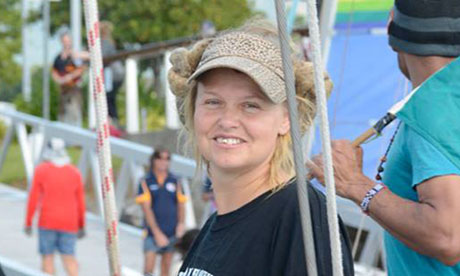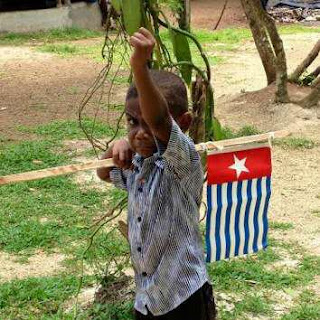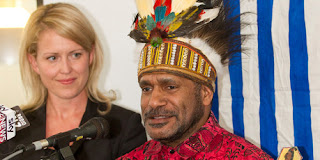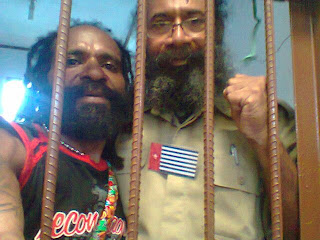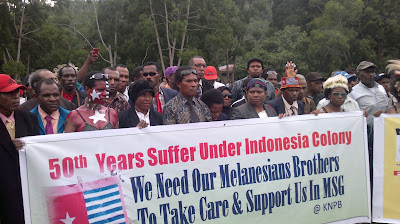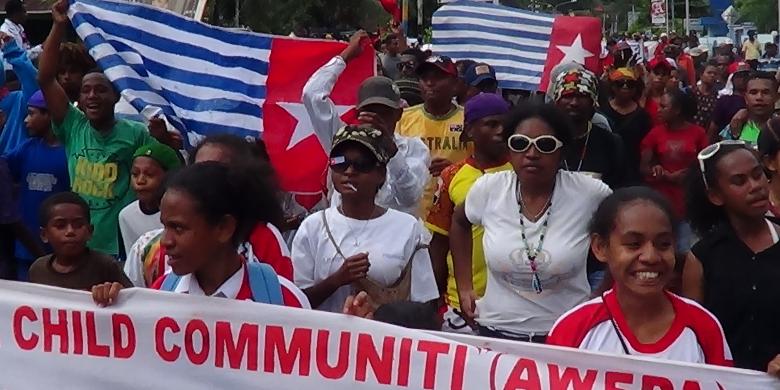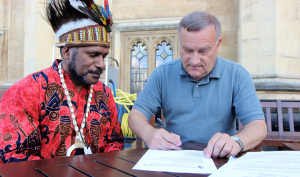West Papua is becoming an international problem for the Indonesian government.
 |
| Papua Hiland |
Tineke Rumkabu handed me a bright yellow piece of A4 paper, double-sided, and folded in half. The official looking invitation was to attend a gathering at the Biak Numfor police station on July 1, 2013. The event, the invitation stated, would include opportunities for Papuans to ask questions of the local Indonesian police and would conclude with prayers. The brightly colored paper looked innocent enough, but in the context of West Papua’s 50-year independence struggle, it was imbued with sinister undertones.
Resistance Leaders
Rumkabu knows, as does every politically aware West Papuan, that many indigenous independence leaders, who have risen up and commanded mass appeal since the Indonesian government took control of the western half of New Guinea in May 1963, have either been jailed or killed.
The list reads like a who’s who of Papuan political leaders: Arnold Ap and Eddie Mofu, arrested for collecting and singing traditional Papuan songs and murdered by the Indonesian Special Forces in 1984; Thomas Wainggai, arrested in 1988 for organizing an independence rally and died in prison in 1996; Theys Hiyo Eluay, invited to dinner with the Indonesian military and then strangled to death; Kelly Kwalik, a Papuan guerrilla, killed by the US and Australian trained Detachment 88 anti-terrorist police troops in December 2009; and Mako Tabuni, shot dead by Detachment 88 in June 2012.
According to Papuans Behind Bars, a coalition of local and international advocacy groups, at the end of June, 57 West Papuan political prisoners were being detained. These are not violent separatists — every single one has been jailed for determined nonviolent agitation, despite the fact that the Indonesian constitution protects freedom of speech. The list of West Papuan political prisoners includes Filep Karma, jailed for 15 years for nonviolently raising the banned Papuan independence flag, The Morning Star, in 2004; Victor Yeimo, the head of the West Papua National Committee, in jail for organizing nonviolent demonstrations for a referendum on independence; and Forkorus Yaboisembut, the president of the National Federated Republic of West Papua, who was savagely beaten by police and then jailed for three and a half years after declaring independence from Indonesia at a peaceful rally.
Rumkabu, was under no illusions about why she was invited to the Biak Numfor police station. “I received this invitation because I organized a nonviolent demonstration, protesting killings and human rights violations by the Indonesian police and military in the highlands of West Papua,” she said. “They want to question me.”
The Biak Massacre
It was not the first time Rumkabu had been “questioned” by the Indonesian police. In the pre-dawn hours of July 6, 1998, Rumkabu made a pot of coffee and took newly baked cakes out to Papuan protesters who had been camping out at a water tower — a prominent land mark in the centre of Biak. The demonstrators had been brought together by the aforementioned public servant and independence leader, Filep Karma, who is now in jail.
After passing out cakes and serving coffee, Rumkabu stayed at the water tower chatting, singing and praying with the protesters. “We were empty handed,” she recalled. “We had no weapons. All we wanted was independence; to separate from Indonesia.”
Suharto, the former Indonesia dictator, had just been overthrown by tens of thousands of unarmed civilians in Jakarta. Democracy was in the air around the archipelago but, in West Papua, it was independence the people wanted, not reform. This was a view the Indonesian military were not prepared to tolerate. For days, troops had been gathering in Biak City. Indonesian navy warships – at least one of which was sold to Indonesia by the German Government – and C130 Hercules planes, the kind of aircraft the Australian government intends to donate to Indonesia, brought in heavily armed troops. Local troops were augmented with fresh soldiers from Hassanuddin Company and Pattimura from Ambon, two neighbouring provinces of West Papua. Local villagers from the surrounding hamlets were press ganged into militias and told to arm themselves with sharp implements. Captain Andrew Plunkett, a former intelligence officer who worked at the Australian Embassy in Jakarta, called it “a dress rehearsal” for the militia-backed military-led bloodletting and destruction that occurred post-referendum in East Timor in 1999.
At approximately 4:30am on July 6, 1998, the troops opened fire. A week later, Edmund McWilliams, who at the time was a Political Counsellor in the US Embassy in Jakarta, visited Biak. He saw the bullet holes, chest high; pock marks over the water tower. It is not known how many died that day and in the days that followed. No independent investigation has ever taken place. The Indonesian government refuses to allow it and in turn, instead of prosecuting the perpetrators, it jailed the victims. But we know from the testimony of Rumkabu and others, and the work of West Papuan human rights defenders from Elsham, the Institute for the Study and Advocacy of Human Rights in West Papua, that it was a massacre.
The Dead and Dying
In the case of the Biak Massacre the killings did not end with the shooting at the water tower. Rumkabu describes how she was imprisoned by police in what can only be described as a rape camp. “I saw women abused and killed in the most horrific ways. A young girl was raped [and] then had her breasts cut off in front of me,” Rumkabu said. According to Elsham and witnesses, the dead and dying were thrown into trucks and taken to the wharf where they were loaded on to at least two waiting warships — the KRI Kapap and the KRI Telek Berau — an odious gift from the German government.
Those still alive were killed, the bodies were mutilated, and then thrown overboard. In the days following July 6, corpses, many missing body parts, washed up on the beaches of Biak or were pulled out of the water by fishermen. Irene Dimara told me fisherman found her brother, Dance Korwa. “His penis had been cut off, he had no eyes, his teeth had been pulled out, and he had more than five stab wounds in his belly.”
Shooting nonviolent protesters dead at the tower is one thing, but the level of cruelty and intentionality involved in loading people on boats, killing them, mutilating their bodies and dumping them overboard takes this state crime to a whole new level. The fact this happened in a supposedly democratic Indonesia, several months after former Indonesian dictator President Suharto had been overthrown and a new democratic government installed, and the fact that what happened has been covered up since, compounds the Indonesian government’s complicity.
Fifteen years later, survivors, witnesses and their allies had come together to seek justice. Rumkabu was our star witness in a citizen tribunal held at Sydney University. Our goal is to marshal compelling evidence to reopen the case. As part of the proceedings, we had also smuggled an interview with Filep Karma, the man who organized the Biak protests in July 1998, out of an Indonesian jail. The Tribunal was streamed live to audiences around the world with parallel events in Jakarta, New York and London.
West Papua: A Growing International Problem
The meaning of Rumkabu’s simple artefact — the invitation on a piece of colored paper to meet Indonesian police, and the events that coalesced around it including the Citizens Tribunal — reveals much about violence and resistance in occupied West Papua. It illustrates five salient dynamics of the conflict.
Firstly, Indonesian state violence against Papuan civilians clamouring for independence is systemic and systematic.
Secondly, that violence is ongoing. The Indonesian security forces continue to carry out human rights violations with impunity. The July 6 Biak Massacre in 1998 was not the first time the Indonesian military opened fire on nonviolent Papuan civilians. It was not the last. In 2012 alone, Detachment 88 allegedly carried out 22 extra-judicial killings of members of the West Papua National Committee. Even as I wrote this article, news came in that five activists had been arrested in Jayapura, the capital.
Thirdly, while there are small numbers of armed guerrilla groups still active in the jungles and mountains, the overwhelming resistance by the Papuans constitutes an unarmed insurrection in the cities and towns. According to the Indonesian military’s own figures, the nonviolent movement numbers at least 16,000 fulltime activists, while the armed struggle has around 1,300 fulltime guerrillas with a handful of modern firearms and no heavy artillery.
Fourthly, Papuans are casting off fear. They are determined to be free. Rumkabu could have claimed political asylum when she was in Australia. But she did not. Rumkabu has returned back to Biak to insist that Papuans be treated humanely. Karma, an Amnesty International prisoner of conscience, continues to defy Indonesian rule even from within his jail cell.
Finally, as the Biak Citizens Tribunal in Sydney demonstrates, the struggle for justice and political freedom in West Papua is increasingly being internationalized. When the Biak Massacre occurred, it took weeks for the story to get out — now it takes hours. Because of this kind of pressure, the Indonesian government recently agreed to let a delegation of foreign ministers from Papua New Guinea, Fiji, the Solomon Islands, and Vanuatu visit West Papua.
A Dilemma for State
Mama Tin, as she is known by her friends, was not born when the Indonesian government took control of West Papua in 1963, nor was Filep Karma. The Papuans protested vigorously at the time, but their voices were silenced.
The Indonesian government has had 50 years to persuade several generations that they are better off being part of Indonesia, but they have not succeeded. Poverty remains high in many places, health and educational services are non-existent, and the police and army are universally seen as an occupying force by ordinary Papuans. Now, a new generation is rising up. The fact they are doing so fearlessly and without arms is even more remarkable.
All this poses a dilemma for the Indonesian state. One way the state has handled this dilemma has been to deny media access to international journalists, while trying to reassure the international community that everything is fine. The only problem is maintaining control, which relies on repression and restricting press freedom of an increasingly restive and internationally connected citizenry. Yet if the Indonesian state eases its authoritarian control, they run the risk of losing control.
The state cannot have it both ways. Either they have nothing to hide and let the international press see what is happening in West Papua, or they admit they are an occupying army committing human rights violations to maintain an increasingly tenuous claim that their rule in West Papua is legitimate. Ultimately, the Indonesian government will need to enter into some kind of political settlement.
West Papua is Indonesia’s Palestine. Until people like Karma and Rumkabu have the opportunity to freely decide whether they want to remain with Indonesia or not, any claims by the Indonesian state that West Papua is a democracy will ring hollow.
The views expressed in this article are the author's own and do not necessarily reflect Fair Observer’s editorial policy.
Image: Copyright ©
Shutterstock. All Rights Reserved
